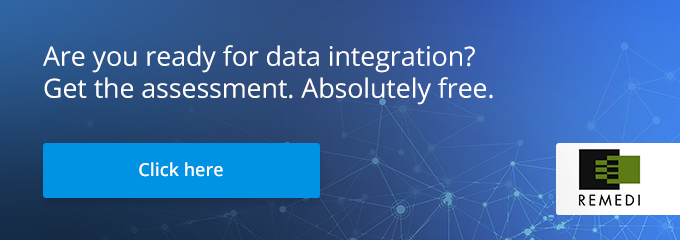
Supply chain management is top of mind for many businesses at the moment. The global coronavirus pandemic has disrupted the supply chain. Companies are scrambling to maintain business continuity and meet customer demand. They realize moving toward a digital supply chain is the best path forward.
However, what’s the best step to take to achieve a digital supply chain? We’ve identified four strategies to help you stay sustainable and relevant.
(See some of our recent data transformation success stories to help you visualize how digitization can benefit your company.)
IoT
The abbreviation “IoT” stands for “Internet of Things.” It refers to networked devices that transmit information without the aid of human intervention.
IoT has a number of use cases for the supply chain. Automated equipment with sensors can tell you about the performance of your assembly line, while connected consumer products (such as smartwatches) give you insight into what your customers want. Most importantly, IoT gives you valuable streams of information so that you can make better business decisions.
AI
AI is another cutting-edge technology with a wide variety of use cases in the digital supply chain. You’ll see it working in tandem with IoT quite frequently; automated equipment in factories streamlines production and frees human workers to perform value-added services. Additionally, AI helps firms predict supply chain disruptions.
As with IoT, AI can give you valuable streams of information. Additionally, it can help you make sense of your data, so you can make the right choices for your firm.

Blockchain
Blockchain isn’t just for cryptocurrencies; it ensures transparency and visibility in the supply chain. These digital ledgers, in which all parties must agree on an entry before it’s recorded, provide a new way for trading partners to share information with one another.
Within the digital supply chain, blockchain will play an increasingly important role in the future. It’s much more efficient and reliable than paper documents, or even such methods of communication as emails or faxes.
Modern B2B Integration Tools
While the aforementioned technological advances are vital to establishing a digital supply chain, you need to have a solution that serves as the underpinning for all of these technologies. IoT and AI both bring in streams of information into your firm. Blockchain requires up-to-date, accurate information to function properly.
That’s where modern B2B integration comes into the picture. Modern B2B integration tools bring information streams together so that you have greater visibility into your operations. Specifically, today’s B2B integration technologies accommodate solutions such as IoT, AI, and blockchain. They’re built with the future in mind.
Taking the First Step to the Digital Supply Chain
If your supply chain maturity is lacking, how can you move forward? Shifting toward a digital supply chain isn’t something that happens overnight. Manual processes don’t automate themselves.
The good news is that you don’t have to go it alone. With the right partner, a digital supply chain is within your grasp. Choose a firm that has experience with modern B2B integration and understands your industry as well as your company’s unique workflows. The right partner wants to build a long-term relationship with you so that your firm benefits from modern B2B integration.
Remedi partners with clients across a wide range of industries to provide the B2B integration infrastructure that supports a digital supply chain. Are you ready for data integration? Get the assessment. Absolutely free.




